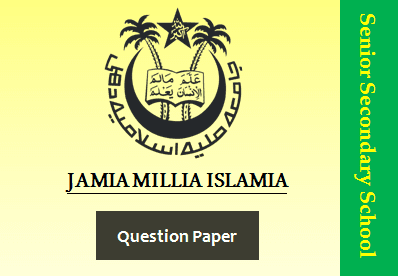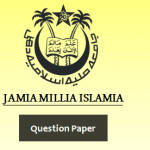JMI Class XII Political Science Sample Question Paper 2020 Download Free PDF
Jamia Millia Islamia (JMI) 2020 Class XII Political Science Sample Question paper with answers JMI Class XII Political Science Sample 2020 Question with solution you can download it in FREE, if JMI Class XII Political Science 2020 paper in text or pdf for JMI Class XII Political Science Sample 2020 Answer Keys you can download JMI 2020 page also just Go to menu bar, Click on File->then Save.

JMI Class XII Political Science Question Paper 2020 Download Pdf
Jamia Millia Islamia (JMI) 2020 Class XII Political Science Sample Question paper Free Download PDF is available in www.oldquestionpapers.net which has been provided by many students this JMI 2020 paper is available for all the students in FREE and also JMI Class XII Political Science Question paper 2020 fully solved JMI with answer keys and solution.
You can get daily updates on JMI 2020 from www.oldquestionpapers.net here you can also check similar links for other related study materials on JMI Class XII Political Science (MCQ) Here Jamia Millia Islamia (JMI) Class XII Political Science question bank 2020 is also available in Class XII Political Science, English Language.
SAMPLE QUESTIONS
A. The various steps undertaken by IMF, World Bank to make a transition from communism to capitalism are as follows:
- a) Each of these countries was required to make a total shift to a capitalist economy, which meant rooting out completely any structure evolved during the Soviet period.
- b) It meant that private ownership was to be the dominant pattern of ownership of property. Privatization of the state assets and corporate ownership patterns were to be immediately brought in.
- c) Collective farms were to be replaced by private farming and capitalism in agriculture.
- d) Development was now to be envisaged through more trade, and thus a sudden and complete switch to free trade was considered essential. The free trade regime and foreign direct investment (FDI) were the main engines of change.
B. The main reasons responsible for the disintegration of USSR were:
Political limitations of the Soviet System:-
- i. The Soviet system became very bureaucratic and authoritarian, making life very difficult for its citizens. Lack of democracy and the absence of freedom of speech stifled people who often expressed their dissent in jokes and cartoons.
- ii. Most of the institutions of the Soviet State needed reforms: the one party system represented by the Communist party of the Soviet Union had tight control over all institutions and was unaccountable.
Economic limitations:
- I. Economic stagnation for many years led to severe consumer shortages and a large
section of Soviet society began to doubt and question the system. - II. The Soviet economy used much of its resources in maintain a nuclear and military
arsenals and the development of the satellite states in Eastern Europe and within the
Soviet system. This led to huge economic burden that the system could not cope with.
C. The major land reforms carried in India were:
i) Abolition of Zamindari system,
ii) Consolidation of small land holdings and
iii) Putting an upper limit or ceiling on the maximum amount of land one can possess.
- Some of these land reforms could not be properly implemented in India because the landowners were very powerful and yielded lot of political influence.
- As a result these land reforms were either not translated into laws or when made into laws, they remained only on papers.
D. The consensus consists of four elements:
- First, agreement on new economic policies.
- Second, acceptance of the political and social claims of the backward castes.
- Third, acceptance of the role of the state level parties in governance of the country.
- Fourth, emphasis on pragmatic considerations rather than ideological positions and political alliances without ideological agreement.
E. a) The developed countries of the first world generally referred to as “Global North” were concerned with ozone depletion and global warming, whereas the developing countries of the third world called the “Global South” were anxious to address the relationship between economic development and environmental management.
b) 1. There were major differences between the countries of the North and the South over environmental issues. The developed countries of the North wanted everyone to be made equally responsible for ecological conservation. The Global South on the other hand felt that much of the environmental degradation caused today is the result of economic activities pursued by the Global North. Hence they believed that the Global North owes a greater responsibility of undoing the damage now.
b) 2. Moreover, the developing countries are undergoing a process of industrialization and they should not be subjected to the same restrictions which apply to the developed countries.
b) 3. These two concerns were effectively addressed by the Principle of ‘Common but differentiated responsibilities’. It accepted that the special needs of the developing countries be taken into consideration and in view of different contributions of global environmental degradation, states have common but differentiated responsibilities.
![]() Class XII Political Science 2015-2016
Class XII Political Science 2015-2016
Senior Secondary School (Morning Shift) Subject Wise
- Download Sample Question Paper 2015-2016 Class XII Accountancy
- Download Sample Question Paper 2015-2016 Class XII Biology
- Download Sample Question Paper 2015-2016 Class XII Business Studies
- Download Sample Question Paper 2015-2016 Class XII Chemistry
- Download Sample Question Paper 2015-2016 Class XII Computer Science
- Download Sample Question Paper 2015-2016 Class XII Economics
- Download Sample Question Paper 2015-2016 Class XII English
- Download Sample Question Paper 2015-2016 Class XII Geography
- Download Sample Question Paper 2015-2016 Class XII Hindi
- Download Sample Question Paper 2015-2016 Class XII History
- Download Sample Question Paper 2015-2016 Class XII Math
- Download Sample Question Paper 2015-2016 Class XII Multimedia and Web Technology
- Download Sample Question Paper 2015-2016 Class XII Physics
- Download Sample Question Paper 2015-2016 Class XII Political Science
- Download Sample Question Paper 2015-2016 Class XII Sociology
Don’t Forget to Check
- JMI Senior Secondary School Sample (Morning Shift) Question Paper 2020
- JMI B.Ed Entrance Question Paper Previous Year Old Past Paper 2020
- Jamia Millia Engineering Entrance 2020 Mock Test Paper Answer JMI
- JMI Engineering Entrance Model Question Paper 2020
- JMI Engineering Entrance 2020 Question Paper Answers Previous Year Paper
- JMI M.Ed. Elementary Education 2020 Syllabus Admission Procedure Eligibility
- JMI M.Ed 2020 Syllabus Admission Procedure Eligibility
- JMI B.Ed Entrance Teaching Aptitude Question Paper 2020 Sample Model Paper
- JMI B.Ed Entrance Reasoning Question Paper 2020
See Also….

